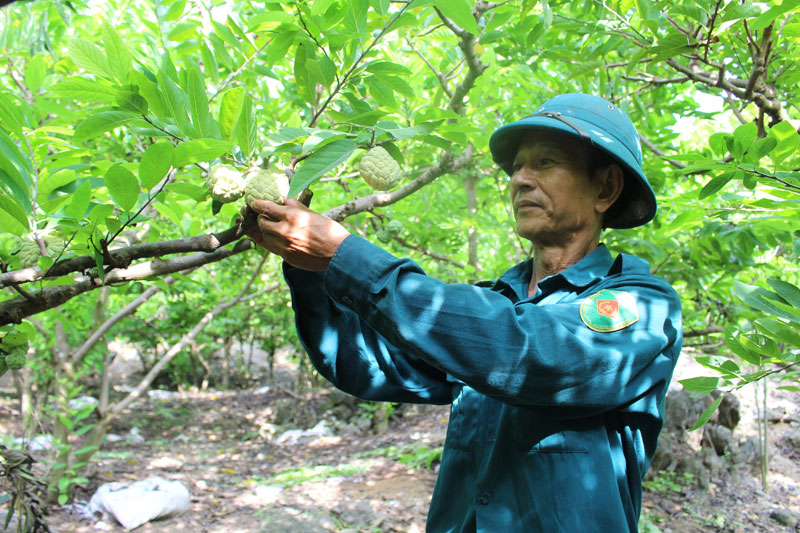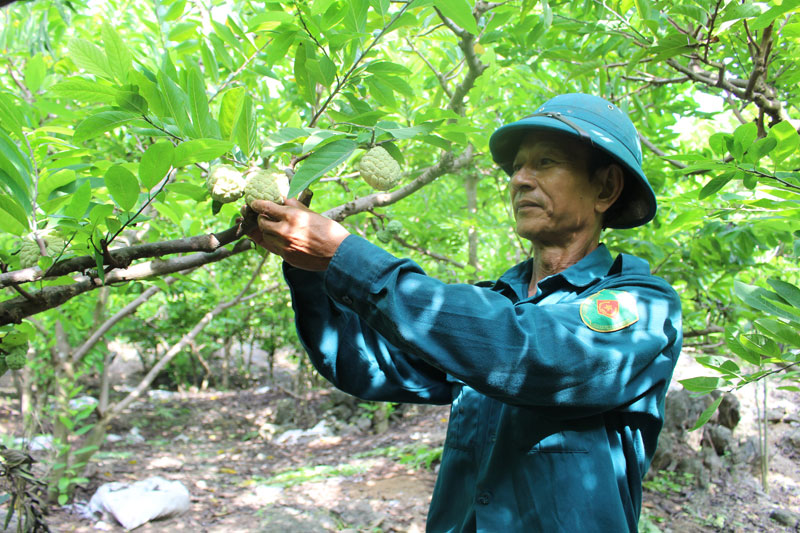
(HBO) – Statistics show that the total area under custard-apple growing in Dong Tam commune, Lac Thuy district, stands at 40ha, mainly in Dong Bong and Dai Dong hamlets. Local farmers had recognised that natural pollination brings about low quantity and quality. They, therefore, they decided to intervene in the natural pollination process.
 Custard-apples
in Dong Tam commune in Lac Thuy district have high quality thanks to hand
pollination.
Custard-apples
in Dong Tam commune in Lac Thuy district have high quality thanks to hand
pollination.
Hand
pollination has helped to improve custard-apple quality, while enabling farmers
to control harvest seasons.
Apart
from the main crop in August, the hand pollination method has also created an
unseasonal crop in Dong Tam in October when each kg of custard-apple is sold at
the price of about 60,000-80,000 VND per. During the main crop, local farmers
reaped 15-17 tonnes of custard-apple per ha. Traders from Ninh Binh, Hanoi and
Ha Nam have come to buy this fruit.
Thanks
to the fruit, living standards of farmers in Dong Bong and Dai Dong have been
improved significantly. This year, Dong Bong custard-apple grown by the Dong
Tam Service Cooperative has joined the "One Commune, One Product” programme.
To
support the cooperative and farmers, Dong Tam authorities have partnered with
the district’s Bureau of Agriculture and Rural Development to invite consulting
agencies that have helped the cooperative with necessary procedures.
At
the same time, the bureau has step up the communication work to encourage local
farmers to pay more attention to custard-apple growing techniques. The
commune is working towards VietGap standards in custard-apple growing in 2021.''
Both
authorities and people in Dong Tam hope that the product will meet provincial
OCOP standards this year, helping to promote the brand name of Dong Dong
custard-apple. /.
According to data from the Hoa Binh Provincial Party Committee, the industrial production index for the first six months of 2025 is estimated to have increased by 20% compared to the same period last year. This marks the highest year-on-year growth rate for this period since 2020.
In the first six months of 2025, Hoa Binh province’s export turnover was estimated at 1.145 billion USD, marking an 18.11% increase compared to the same period in 2024. Import turnover was estimated at $ 804 million, a 17.15% increase, which helped the province maintain a positive trade balance.
The lives of the ethnic minority farmers in Tan Lac district have gradually improved thanks to the new directions in agricultural production. This is a testament to the collective strength fostered through the professional associations and groups implemented by various levels of the district’s Farmers’ Union.
With the motto the "product quality comes first,” after nearly one year of establishment and operation, Muong village’s Clean Food Agricultural and Commercial Cooperative, located in Cau Hamlet, Hung Son Commune (Kim Boi district), has launched reputable, high-quality agricultural products to the market that are well-received by consumers. The products such as Muong village’s pork sausage, salt-cured chicken, and salt-cured pork hocks have gradually carved out a place in the market and they are on the path to obtaining the OCOP certification.
In the past, the phrase "bumper harvest, rock-bottom prices" was a familiar refrain for Vietnamese farmers engaged in fragmented, small-scale agriculture. But today, a new spirit is emerging across rural areas of Hoa Binh province - one of collaboration, organisation, and collective economic models that provide a stable foundation for production.
Maintaining growing area codes and packing facility codes in accordance with regulations is a mandatory requirement for agricultural products to be eligible for export. Recently, the Department of Agriculture and Environment of Hoa Binh province has intensified technical supervision of designated farming areas and packing facilities to safeguard the "green passport" that enables its products to access international markets.



 Custard-apples
in Dong Tam commune in Lac Thuy district have high quality thanks to hand
pollination.
Custard-apples
in Dong Tam commune in Lac Thuy district have high quality thanks to hand
pollination.